JIU Josai International University

“International University Forum” held to discuss how career support for international students should be from industry, academia, and government perspectives
University events
2023.03.06
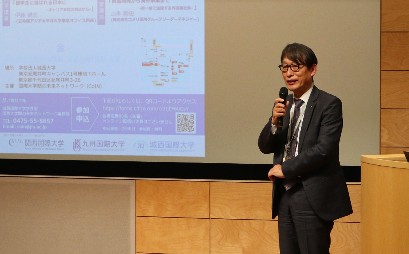
Kenji Sugibayashi University President
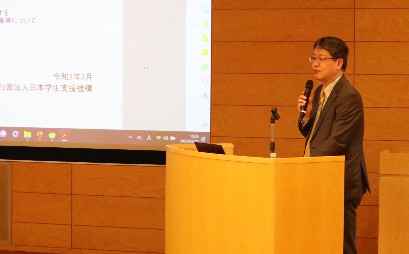
Kazuhiko Yano, Chancellor President, Japan Student Services Organization
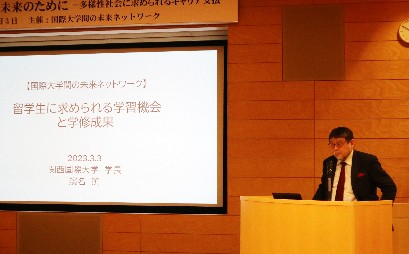
Atsushi Hamana, University President of Kansai University of International Studies
"The 3rd International University Forum" sponsored by "International Inter-University Future Network" (CoIN, Chairman: Kenji Sugibayashi, University President Josai International University University) was held on March 3 at Kioicho Campus in Tokyo. The theme of this year's event is "For a bright future for international students - Career support required in a diverse society -". We had a heated discussion about issues that should be resolved and issues that should be addressed by All Japan.
At the beginning of the meeting, University President Sugibayashi said, "Compared to career support for foreign nationals who grew up in Japan, support for international students has been weak so far. This time, we would like to focus on that and have a lively discussion." I opened the door.
Next, Mr. Kazuhiko Yano, Chancellor the Japan Student Services Organization, took the podium and gave a keynote speech titled "Current Situation and Challenges of Career Support for International Students." Mr. Yano pointed to the data that the employment rate of foreign students in Japan was 52% in 2011 and 65% in 2013, but now it is less than 60%. I think this number will recover.The most lacking thing is information for international students who want to find a job." He added, "In addition to the interest in Japanese culture and the safety of the country, many students cite the low cost of studying in Japan as their reason for choosing Japan as their study abroad destination. Most of the companies mentioned that they want to secure good human resources." He explained the government's measures to promote study in Japan and support employment.
Next, on behalf of the organizers, Atsushi Hamana, University President of Kansai University of International Studies, gave a lecture on "Learning Opportunities and Learning Achievements Required of International Students." Mr. Hamana pointed out the challenges of career education for international students, such as Japanese language skills, Japanese culture and customs, and compatibility with part-time jobs. There are quite a few international students who didn't get it. As an example of breakthrough measures, he introduced the efforts of the "Career Support Project for International Students" developed in collaboration with universities in Hyogo Prefecture, and said, "Internships need to change from unpaid to paid, from experience-based to problem-solving. There is.
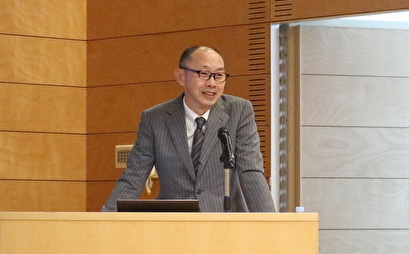
Takeshi Ito, Director of Ritsumeikan Asia Pacific University Tokyo Office
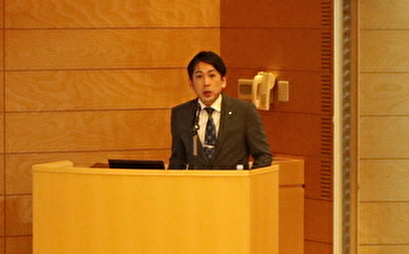
Takeshi Yamamoto Komeri Hiring Group Leader Manager
In the second half, Ritsumeikan Asia Pacific University (APU), which is known for its high international student ratio, has Tokyo Office Director Takeshi Ito, and Komeri's Takeshi Yamamoto, Recruitment Group Leader and Manager, as guest speakers. We invited them and asked them to make suggestions from their respective positions.
Mr. Ito pointed out that in addition to companies demanding high Japanese language proficiency, due to the economic situation in Japan, the number of international students who want to work in Japan is on the decline. On the other hand, he mentioned that there are many international students who are attracted to working in Japan, as the infrastructure, sanitary environment, safety, etc. are of the highest standards in the world, and even undergraduate graduates can become executive candidates for top companies. Human resources are the companions who will build the next Japan, and will not make up for labor shortages.We need to redefine global human resources." ``There is a global competition for highly skilled human resources, and universities alone cannot win. Mr. Ito, who emphasized that, proposed that "managers should first study abroad" in order for Japanese society to change.
Yamamoto commented on the Japanese language proficiency that each of the speakers pointed out, saying, "In interviews, there are N2 students who have higher communication skills than N1 students (the highest level in the Japanese Language Proficiency Test)." After talking about his experience in the field, he introduced examples of foreign employees who are active on the front lines. After graduating from a Japanese university, in his sixth year with the company, he continued to develop gardening supplies, flooring materials, and other products one after another, telling us how he has created hit products. He also touched on visa issues faced by international students trying to work in Japan, and pointed out the need for flexible responses in switching from student visas to work visas.
There was a lively question and answer session with the floor, and the whole venue thought and shared what we should do now and what we can do in order to have the people who will lead the next generation choose to work in Japan.